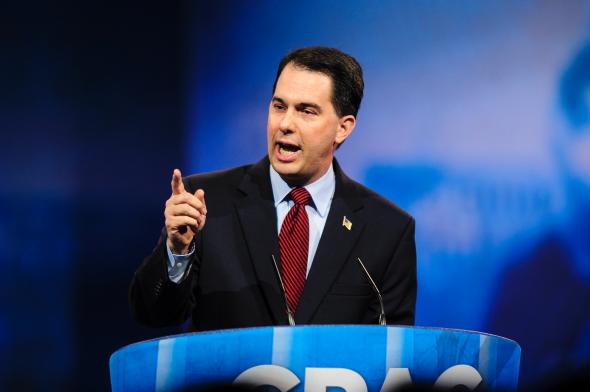Scott Walker’s Foreign Policy: Reagan, Reagan, and More Reagan

Photo by Pete Marovich/Getty Images
Wisconsin Gov. Scott Walker has rarely talked about foreign policy. There have been no disputes with Canada about the riches of Lake Superior; there's been plenty to do at home, without reporters even really asking about the world outside Wisconsin. So it's interesting that Walker engaged with Phil Klein when the reporter asked him to sketch out some national security views. Less interesting: Walker's actual answer, which led off with the Ronald Reagan reference he has previously used to explain his collective bargaining reforms.
"When Ronald Reagan took that action against the air traffic controllers, that in my mind was the beginning of the end of the Cold War," he said. "And the reason was, from that point forward nobody doubted how serious Ronald Reagan would be as president. Our allies knew that they could trust him, that he was rock solid. Our adversaries knew not to mess with him. And even though he presided over an incredible buildup in our nation’s national defense, in our military, we had very few, very limited military engagements during his eight years as president."
Brief interruption: How many troops has the president sent into action in five years? Pilots, sure; special forces into combat zones inherited from the Bush administration, sure. I'd also suggest that Reagan's funding for armies that wore down the Russians and their allies (Afghanistan, Nicaragua) had more to do with the American advance than Reagan's air traffic controller decision, but whatever, let's go with it.
“To me, if you have a strong America led by a strong president who makes serious statements about what they mean not only on national security and foreign policy, but on all other issues, we're not going to be faced with many of these situations because people will know if they're allies we can be counted on and if they're adversaries not to mess with us,” he said. “And when we have an America where … Prime Minister Netanyahu was in the White House getting the cold shoulder from the president who still can't figure out exactly where they stand on Israel, and when you have… a red line in discussions about Syria which apparently (he) was never serious about doing anything about, no wonder, whether you were in Iran or Russia, or anywhere else around the world, no wonder people feel certain comfort taking action because they don't see this administration as willing to act. I'm not necessarily encouraging that we draw red lines all over the place. My sense is just, you shouldn't point a gun at somebody if you're not prepared to shoot.”
That's just a K-Tel greatest hits of conservative hits on the president. Not terribly useful for understanding Walker ... until you recall that his memoir, which contained almost no foreign policy, was co-written by Bush/Rumsfeld veteran Marc Thiessen. What's he been saying about Obama?
Obama’s failure to enforce his red line in Syria projected weakness. His constant talk of withdrawal and ending wars so we can focus on “nation-building here at home” projects weakness. His decision to gut the U.S. defense budget and reduce the Army to pre-World War II levels projects weakness.
So there's a script here, if Walker needs something to rely on.
